Semmelweis University’s patient care is carried out on the highest level and it has several departments treating patients in critical condition. Cutting-edge technology enables the establishment of the most accurate diagnosis, like in the case of organ transplantations and certain procedures are available only at the university.
Patient care at the university is an integral part of the education of medical and healthcare professionals, which is acknowledged worldwide.
Since its foundation in 1769, Semmelweis University has paid special attention to the continuous development and expansion of its healthcare services. As a result, the university has grown into one of the largest healthcare institutions in Hungary. The University has over 40 departments distributed among the 4 main clinical centers.
Semmelweis University is one of the country’s largest patient care institutions. In 2023, the university treated more than 170,000 cases of 96,700 inpatients and 2.66 million cases of 425,500 outpatients. There are currently 2,057 active inpatient beds and 285 chronic inpatient beds.
At Semmelweis University, we pride of our diverse range of 40 departments. While each department plays a crucial role in our institution, detailing every aspect of each one would be overwhelming. Instead, we have highlighted key departments here to provide a glimpse into the wide variety and depth of our academic fields.
Department of Internal Medicine and Oncology
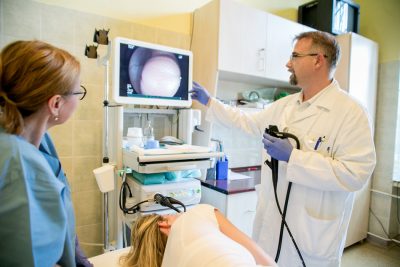 The Department of Internal Medicine and Oncology focuses on patient care, education and scientific research mainly in the fields of endocrinology and metabolic disorders, nephrology and gastroenterology. Its oncology profile is specialised in treating gastrointestinal and breast cancer patients. The Department provides complex regional internal medicine care, allowing to introduction of the widest range of internal medicine diseases to students. It teaches Semmelweis students in three languages: Hungarian, English, German.
The Department of Internal Medicine and Oncology focuses on patient care, education and scientific research mainly in the fields of endocrinology and metabolic disorders, nephrology and gastroenterology. Its oncology profile is specialised in treating gastrointestinal and breast cancer patients. The Department provides complex regional internal medicine care, allowing to introduction of the widest range of internal medicine diseases to students. It teaches Semmelweis students in three languages: Hungarian, English, German.
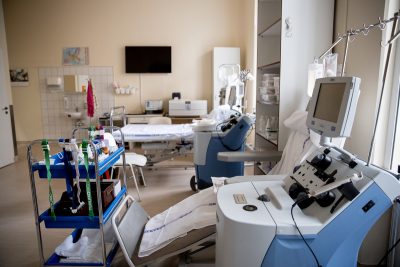 provides patient care on 133 hospital beds and at 12 outpatient units
provides patient care on 133 hospital beds and at 12 outpatient units- has a well-equipped clinical pharmacology research center for research in the earliest phases and all types of clinical research
- operates one of the largest apheresis centers in the country
- has a nephrology unit equipped with 20 hospital beds, which closely cooperates with the Dialysis Center located in the building
- has great diagnostic capacity, including gastroscopy, colonoscopy,
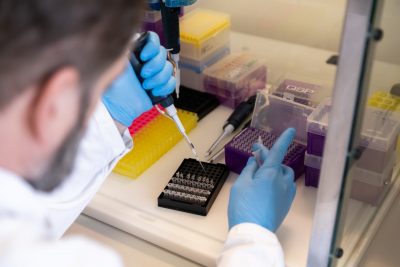 enteroscopy, abdominal and heart ultrasound, 24-hour blood pressure monitoring, stress ECG, neuropathy clinic, osteodensitometry, and certain types of isotope diagnostics
enteroscopy, abdominal and heart ultrasound, 24-hour blood pressure monitoring, stress ECG, neuropathy clinic, osteodensitometry, and certain types of isotope diagnostics - is one of the leading centers in Hungary for internal medicine research
Department of Surgery, Transplantology and Gastroenterology
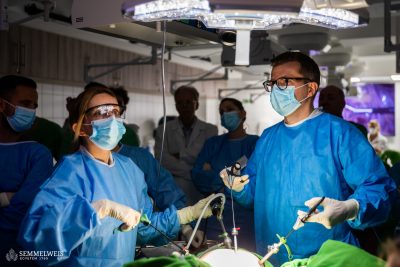 With the integration of the Department of Surgery and Interventional Gastroenterology, the 1st Clinic of Surgery, the 2nd Clinic of Surgery and the Clinic of Transplantation and Surgery in 2021, a unique surgical- gastroenterological complex was created in Hungary, where the disciplines of surgery, anesthesiology and intensive care, and gastroenterology are located under one roof, providing a wide range of services. The Department performs patient care at the highest level, from diagnostics, and rehabilitation to postoperative management, and offers a place for elite training.
With the integration of the Department of Surgery and Interventional Gastroenterology, the 1st Clinic of Surgery, the 2nd Clinic of Surgery and the Clinic of Transplantation and Surgery in 2021, a unique surgical- gastroenterological complex was created in Hungary, where the disciplines of surgery, anesthesiology and intensive care, and gastroenterology are located under one roof, providing a wide range of services. The Department performs patient care at the highest level, from diagnostics, and rehabilitation to postoperative management, and offers a place for elite training.
Every year, more than 150 Hungarian, 200 English, and 100 German-speaking medical students are involved in the surgical program
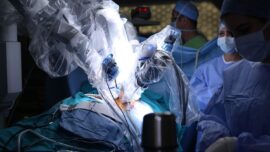 The annual number of surgeries is around 3,500- 4,000, the vast majority of which allow the treatment of conditions that require oncology surgery or the most progressive care
The annual number of surgeries is around 3,500- 4,000, the vast majority of which allow the treatment of conditions that require oncology surgery or the most progressive care- The Clinic is equipped with 101 beds and six operation theatres
- More than 50,000 patients visit outpatient clinics each year
- One-day surgery and advanced laparoscopic methods enable a faster healing process
- 200 kidney and 80 liver implantations and 150- 200 multiorgan retrievals
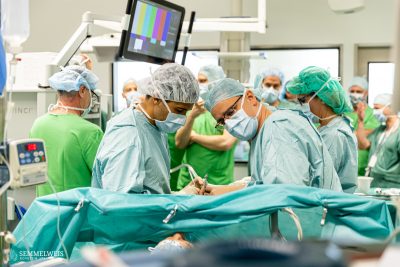 are carried out annually
are carried out annually - The Department is a transplantation training center accredited by the Europen Union of Medical Specialists (UEMS) Transplant Surgery Division
- “Da Vinci” robotic surgery was introduced in 2022
Pediatric Center
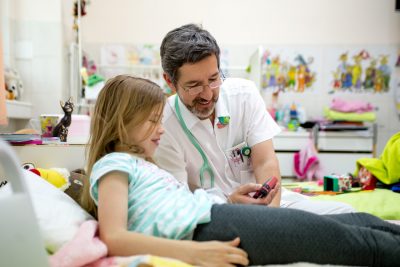 Since January 1, 2023, the two historic sites the Bókay Department and the Tűzoltó Department have been operating under one management at two sites as a unified Pediatric Center, performing a triple task: treatment of sick children, education of the future generation, and research to improve the quality of pediatrics. The Bókay Street unit is now the national centre of excellence for premature, neonatal and infant care, as well as renal and hepatic care, while the Tűzoltó Street unit is traditionally focused on pediatric oncology, pediatric hematology and, more recently, pediatric rheumatology.
Since January 1, 2023, the two historic sites the Bókay Department and the Tűzoltó Department have been operating under one management at two sites as a unified Pediatric Center, performing a triple task: treatment of sick children, education of the future generation, and research to improve the quality of pediatrics. The Bókay Street unit is now the national centre of excellence for premature, neonatal and infant care, as well as renal and hepatic care, while the Tűzoltó Street unit is traditionally focused on pediatric oncology, pediatric hematology and, more recently, pediatric rheumatology.
Both departments also provide education for medical and health science students, vocational and further training for colleagues in three languages.
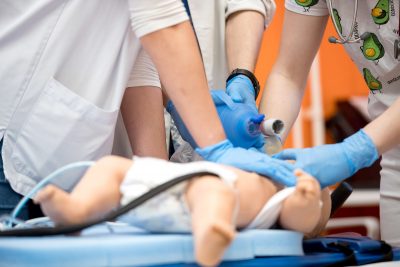 The Bókay University Hospital operates with 160 inpatient beds and provides quality care for children in the following highly specialized (tertiary) services: renal diseases, diabetes mellitus, epilepsy and headache, liver and gastrointestinal disorders, obstructive pulmonary diseases, immune disorders, mental illnesses, neonatal developmental disorders requiring surgical care, neonatal, infant and pediatric surgical and urologic diseases, low birth weight and premature newborns requiring mechanical ventilation, and heart conditions.
The Bókay University Hospital operates with 160 inpatient beds and provides quality care for children in the following highly specialized (tertiary) services: renal diseases, diabetes mellitus, epilepsy and headache, liver and gastrointestinal disorders, obstructive pulmonary diseases, immune disorders, mental illnesses, neonatal developmental disorders requiring surgical care, neonatal, infant and pediatric surgical and urologic diseases, low birth weight and premature newborns requiring mechanical ventilation, and heart conditions.
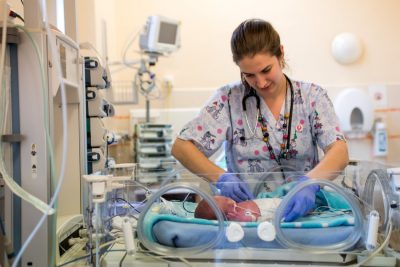 The Tűzoltó University Hospital operates with 124 inpatient beds and provides quality care for children in the following pediatric fields: general pediatrics, pediatric intensive care, cardiology, endocrinology, gastroenterology, genetics, surgery, hematology, hypertension, and metabolic disorders, nephrology, neurology, oncology, immunology, psychology, pulmonology, pediatric radiology, and rheumatology.
The Tűzoltó University Hospital operates with 124 inpatient beds and provides quality care for children in the following pediatric fields: general pediatrics, pediatric intensive care, cardiology, endocrinology, gastroenterology, genetics, surgery, hematology, hypertension, and metabolic disorders, nephrology, neurology, oncology, immunology, psychology, pulmonology, pediatric radiology, and rheumatology.
Heart and Vascular Center
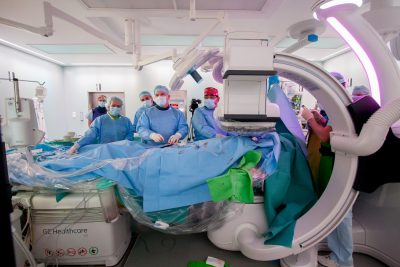 Besides a full cardiology profile, the principal role of the Heart and Vascular Center is to perform invasive cardiology procedures of all types. It has an active role in the treatment of acute myocardial infarction cases with urgent coronary angioplasty (primarily PCI) covering the capital Budapest, and the Central Hungarian Region. It is admitting urgent cases and is treating, with urgent percutaneous intervention, acute myocardial infarction cases.
Besides a full cardiology profile, the principal role of the Heart and Vascular Center is to perform invasive cardiology procedures of all types. It has an active role in the treatment of acute myocardial infarction cases with urgent coronary angioplasty (primarily PCI) covering the capital Budapest, and the Central Hungarian Region. It is admitting urgent cases and is treating, with urgent percutaneous intervention, acute myocardial infarction cases.
Gradual medical education takes place in three languages at the Center, which is also taking part in postgraduate specialty training and is also integrated into the School of PhD Studies.
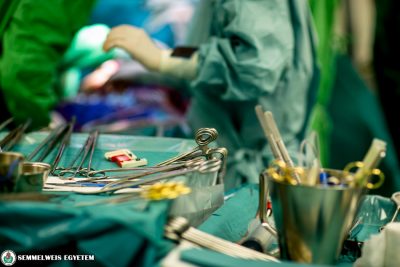 The Cardiovascular Center – Invasive Cardiology Department with 27 beds is the national center for adult heart transplantations. Its mechanical heart program helps patients in a life-threatening condition. Besides the classic vascular procedures, the department participates in several interventional radiological treatments and hybrid interventions.
The Cardiovascular Center – Invasive Cardiology Department with 27 beds is the national center for adult heart transplantations. Its mechanical heart program helps patients in a life-threatening condition. Besides the classic vascular procedures, the department participates in several interventional radiological treatments and hybrid interventions.- The Department of Cardiology with 17 beds is a traditional cardiology department, where patients are treated after interventions that allow for a short hospital stay. Classical medical treatment of patients with heart
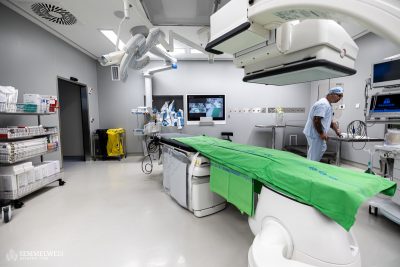 disease is also among the roles of this department.
disease is also among the roles of this department. - The Department of Diagnostic Radiology supports patient care by an imaging diagnostic profile. It operates an imaging lab, focusing on cardiac and vascular imaging with high-resolution and fast CT, and MRI devices.
- The Outpatient Department has besides traditional cardiological examinations special units for patients who underwent pacemaker implantation and also for patients suffering from heart failure.
Department of Ophthalmology
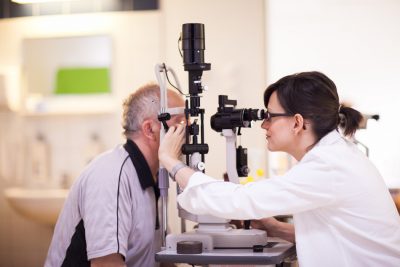 At the Department of Ophthalmology, all modern microsurgical operations and all areas of vitreoretinal surgery are performed. Microsurgery is complemented by other surgical procedures such as operations on the organs of the eye: lacrimal surgery, and plastic and orbital reconstructive surgery. Laser surgery is extensively used in the treatment of glaucoma, secondary cataracts, fundus diseases, and in the alteration of the refraction of the eye. Education at the department is complemented by English and German language education.
At the Department of Ophthalmology, all modern microsurgical operations and all areas of vitreoretinal surgery are performed. Microsurgery is complemented by other surgical procedures such as operations on the organs of the eye: lacrimal surgery, and plastic and orbital reconstructive surgery. Laser surgery is extensively used in the treatment of glaucoma, secondary cataracts, fundus diseases, and in the alteration of the refraction of the eye. Education at the department is complemented by English and German language education.
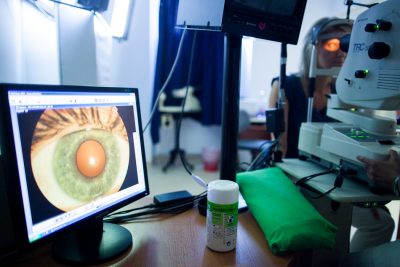 An average of 210-225,000 patients are examined in the outpatient clinics each year.
An average of 210-225,000 patients are examined in the outpatient clinics each year.- The number of patients admitted to the wards is 6-7000 and the clinic performs an average 7-8000 ophthalmological operations annually
- Specialised outpatient units include pediatric ophthalmology, orthoptics, premature infants’ clinic, cornea clinic, glaucoma clinic, diabetes clinic, retina clinic, angiography, optical coherence tomography, electrophysiology clinic, ultrasound laboratory, hereditary retinal diseases clinic, neuro-ophthalmology
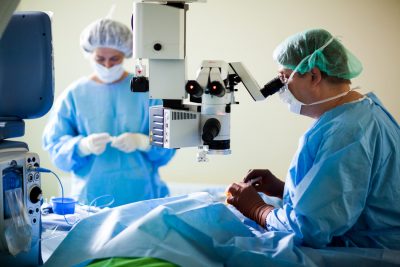 The clinic has its contact lens laboratory, where hard contact lenses are made to the highest standards
The clinic has its contact lens laboratory, where hard contact lenses are made to the highest standards- A counseling service is available to assist in the primary rehabilitation of the visually impaired with teacher and a social worker education. Visual rehabilitation of visually impaired people is an important task of the clinic.
- Modern ophthalmic diagnostics are performed with state-of-the-art instruments.
- The scientific work covers topics in almost all fields of ophthalmology.
